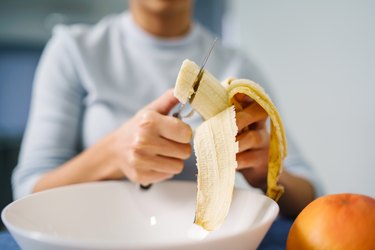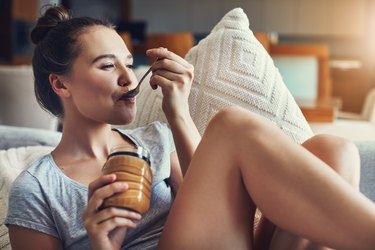
Sleep is an integral part of overall health, but it's overlooked by many. If you struggle to fall asleep at night or find yourself too busy to hit the hay, getting the recommended 8 hours of sleep isn't as easy as it seems.
You can try sleep remedies like sleep supplements, but your food choices may also play a role. We spoke to sleep experts who recommend snacking on bananas before bed to help the mind and body relax and increase your chances of getting a restful slumber.
Video of the Day
Video of the Day
Why Eating Bananas Before Bed May Help You Sleep
There are many reasons to eat bananas before bed or throughout the day. They're full of beneficial nutrients and they may help you get the rest you need.
1. They Can Increase Sleep Hormones
Melatonin is heavily associated with sleep, and it's found in many sleep aids. This hormone occurs naturally in the body, and it's tied to the circadian rhythm.
Melatonin levels are low during the earlier parts of the day and gradually increase as it gets closer to bedtime. As melatonin levels increase, this signals to the body it's time for bed.
Research suggests taking melatonin might slightly lower the time it takes to fall asleep for people with insomnia, but it's important to note there's no evidence showing it improves sleep quality or helps you get more sleep, according to the Mayo Clinic.
Melatonin may be helpful for people with jet lag symptoms or circadian rhythm disorders, per the Mayo Clinic. It may also be useful for older adults, who are more likely to be deficient.
Most melatonin supplements are artificially made, and supplements aren't regulated by the FDA. While melatonin supplements may help, there are other ways to increase your levels of melatonin without relying on supplementation. One trick — eating bananas before bed.
Eating tropical fruits, such as bananas, is associated with increased melatonin levels, according to an August 2013 study in the Journal of Pineal Research. Researchers found melatonin levels were highest approximately 2 hours after eating pineapples, oranges and bananas. Keep in mind this was an extremely small study that didn't look at how this increase in melatonin in the blood may or may not affect sleep.
2. They're Rich in Sleep-Promoting Minerals
Bananas are known for being impressively high in potassium. That and the magnesium in bananas may help you get more rest.
"Bananas have minerals like magnesium and potassium, which can both help you sleep," says Carleara Weiss, PhD, RN, a nurse who specializes in behavioral sleep medicine. "Magnesium increases our natural melatonin production, and potassium reduces muscle cramps, a common problem that may affect sleep."
A medium banana provides 9 percent of your Daily Value (DV) for potassium and 8 percent DV for magnesium, according to the USDA.
3. They Offer Tryptophan
Weiss explains bananas are a source of tryptophan, an amino acid that is converted into serotonin, which is a precursor to melatonin (the sleep hormone we just talked about).
Older research suggests a 1-gram-dose of tryptophan 45 minutes before bed may help people with mild insomnia and those who take longer to fall asleep to get their z's faster, per a March 2003 review in the Journal of Psychiatry and Neuroscience.
Foods that have tryptophan, then, may act as natural sedatives and help you relax, according to the American Sleep Association.
The Bottom Line
Eating bananas before bed may be the simple, delicious and nutritious solution to your sleep problems, but you want to eat them at the right time. "You should avoid taking in too many calories before bedtime, so consider eating your banana at least one hour before going to bed," Weiss advises.
Fortunately, a banana hardly constitutes a heavy meal. A nighttime snack, when carefully chosen, can be beneficial, according to Northwestern Medicine.
A banana with yogurt makes for a great snack before bedtime, according to the Cleveland Clinic. You can also enjoy banana slices with peanut butter.
- Mayo Clinic: "Melatonin"
- Journal of Pineal Research: "Serum melatonin levels and antioxidant capacities after consumption of pineapple, orange, or banana by healthy male volunteers"
- MyFoodData: "Bananas"
- Journal of Circadian Rhythms: "A tryptophan-rich breakfast and exposure to light with low color temperature at night improve sleep and salivary melatonin level in Japanese students"
- American Sleep Association: "Top 10 Foods That Help You Sleep"
- Cleveland Clinic: "6 Foods That Help You Sleep"
- Northwestern Medicine: "Eats to Help You Sleep"
- Journal of Psychiatry and Neuroscience: Is tryptophan a natural hypnotic?


